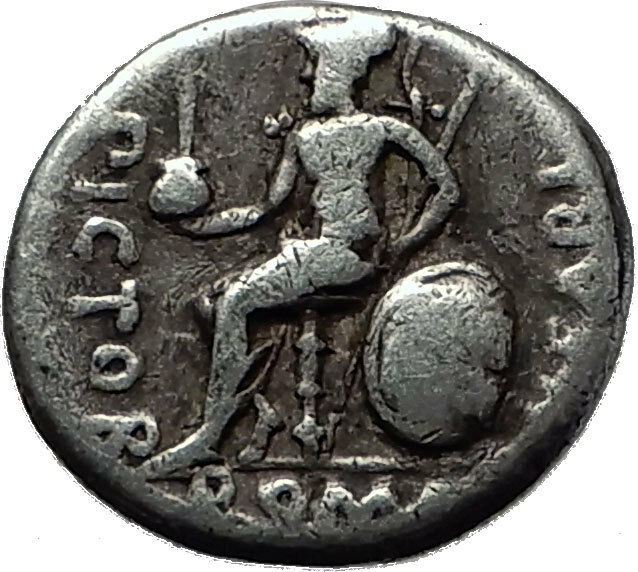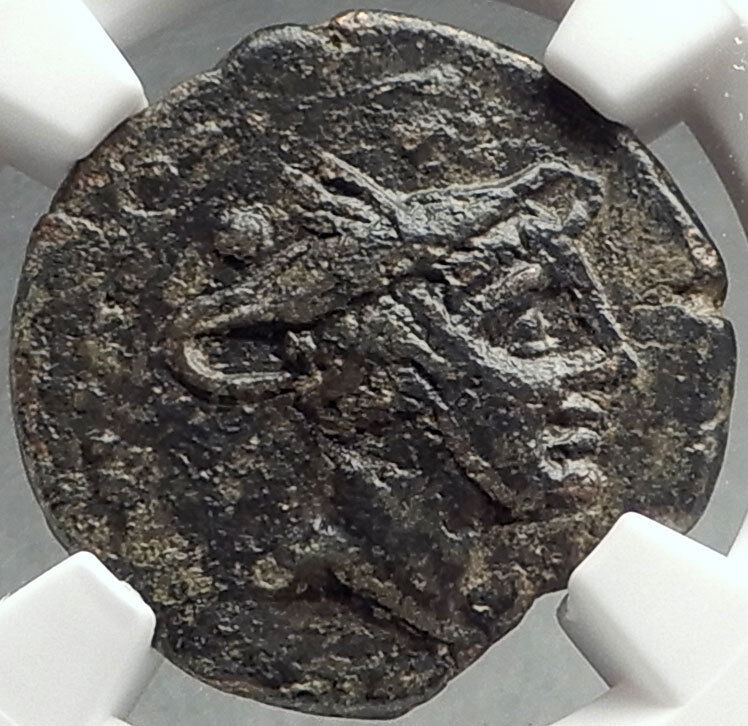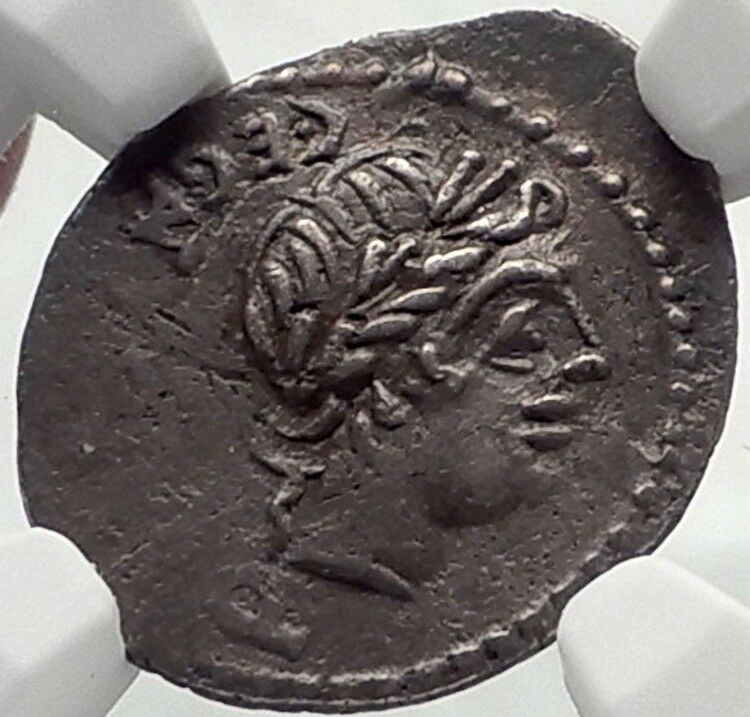|
Mark Antony
Silver Denarius 18mm (2.89 grams) Mint moving with Antony, probably Athens, 33 B.C., under M. Junius Silanus
Reference: RSC 71. Babelon 97. C 71. Sydenham 1208. Sear Imperators 346. RBW 1830. Crawford 542/1
Certification: NGC Ancients VG 4529166-014
ANTON •AVG•IMP•III•COS•DES•III•IIV•R•P•C•, Bare head of Mark Antony right.
M•SILANVS•AVG Q•PRO•COS in two lines.
This issuer, Marcus Junius Silanus, was the step-brother of Brutus who murdered Julius Caesar. After the treaty of Misenum, in 39 B.C., Silanus went to Rome and then to the East to join Antony and was given the governorship of one of the provinces. It was during this period that he struck these coins.
Roman military commander, friend of Julius Caesar, lover of Cleopatra and much more.
You are bidding on the exact item pictured, provided with a Certificate of Authenticity and Lifetime Guarantee of Authenticity.
Marcus Junius D. f. M. n. Silanus was consul in 25 BC with Gaius Julius Caesar Octavianus, the emperor Augustus.
Silanus was a descendant of the noble Roman house of the Junii Silani. He was probably the son of Decimus Junius Silanus, consul in 62 BC, and Servilia, and perhaps the grandson of Marcus Junius Silanus, consul in 109 BC. He was the brother-in-law of Marcus Aemilius Lepidus, the triumvir.
Silanus served as one of Julius Caesar’s legates in 53 BC. He supported his brother-in-law Lepidus in 44 BC after Caesar’s murder, accompanying Lepidus over the Alps. The following year, Lepidus sent him with a detachment of troops to join Marcus Antonius at Mutina, but refused to accept responsibility for the help which Silanus gave. After falling out of favor with the triumvirs, in 39 he fled to Sextus Pompeius. He was able to return to Antonius’s service under the terms of the Pact of Misenum. Silanus later served under Antonius in Greece and Macedonia from 34 to 32, with the title of Quaestor pro consule or perhaps Proquaestor. Around this time he was also elected as an Augur.
Before the Battle of Actium, Silanus went over to Octavianus. The future emperor raised him to the Patriciate in 30 BC, and they held the consulship together in 25.
Silanus’ grandson, Marcus Junius Silanus Torquatus, was consul in AD 19, and married a great-granddaughter of Augustus.
 The Battle of Actium was the decisive confrontation of the Final War of the Roman Republic. It was fought between the forces of Octavian and the combined forces of Mark Antony and Cleopatra. The battle took place on 2 September 31 BC, on the Ionian Sea near the Roman colony of Actium in Greece. Octavian’s fleet was commanded by Marcus Vipsanius Agrippa, while Antony’s fleet was supported by the ships of his beloved, Cleopatra VII, Queen of Ptolemaic Egypt. The Battle of Actium was the decisive confrontation of the Final War of the Roman Republic. It was fought between the forces of Octavian and the combined forces of Mark Antony and Cleopatra. The battle took place on 2 September 31 BC, on the Ionian Sea near the Roman colony of Actium in Greece. Octavian’s fleet was commanded by Marcus Vipsanius Agrippa, while Antony’s fleet was supported by the ships of his beloved, Cleopatra VII, Queen of Ptolemaic Egypt.
Octavian’s victory enabled him to consolidate his power over Rome and its dominions. To that end, he adopted the title of Princeps (“first citizen”) and as a result of the victory was awarded the title of Augustus by the Roman Senate. As Augustus, he would retain the trappings of a restored Republican leader; however, historians generally view this consolidation of power and the adoption of these honorifics as the end of the Roman Republic and the beginning of the Roman Empire.
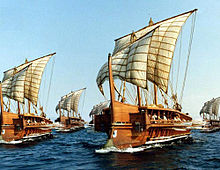 A galley is a type of ship propelled by rowers that originated in the eastern Mediterranean Sea and was used for warfare, trade and piracy from the first millennium BC. Galleys dominated naval warfare in the Mediterranean from the 8th century BC until development of advanced sailing warships in the 17th century. Galleys fought in the wars of Assyria, ancient Phoenicia, Greece, Carthage and Rome until the 4th century AD. After the fall of the Western Roman Empire galleys formed the mainstay of the Byzantine navy and other navies of successors of the Roman Empire, as well as new Muslim navies. Medieval Mediterranean states, notably the Italian maritime republics, including Venice, Pisa, Genoa and the Ottoman Empire relied on them as the primary warships of their fleets until the 17th century, when they were gradually replaced by sailing warships. Galleys continued to be applied in minor roles in the Mediterranean and the Baltic Sea even after the introduction of steam propelled ships in the early 19th century. A galley is a type of ship propelled by rowers that originated in the eastern Mediterranean Sea and was used for warfare, trade and piracy from the first millennium BC. Galleys dominated naval warfare in the Mediterranean from the 8th century BC until development of advanced sailing warships in the 17th century. Galleys fought in the wars of Assyria, ancient Phoenicia, Greece, Carthage and Rome until the 4th century AD. After the fall of the Western Roman Empire galleys formed the mainstay of the Byzantine navy and other navies of successors of the Roman Empire, as well as new Muslim navies. Medieval Mediterranean states, notably the Italian maritime republics, including Venice, Pisa, Genoa and the Ottoman Empire relied on them as the primary warships of their fleets until the 17th century, when they were gradually replaced by sailing warships. Galleys continued to be applied in minor roles in the Mediterranean and the Baltic Sea even after the introduction of steam propelled ships in the early 19th century.
The galley engagements at Actium and Lepanto are among the greatest naval battles in history.
Jupiter is usually thought to have originated as a sky god. His identifying implement is the thunderbolt, and his primary sacred animal is the eagle, which held precedence over other birds in the taking of auspices and became one of the most  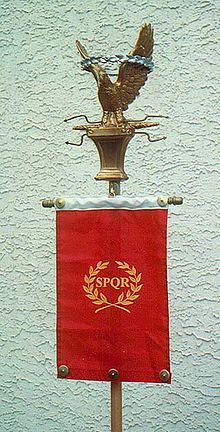 common symbols of the Roman army (see Aquila). The two emblems were often combined to represent the god in the form of an eagle holding in its claws a thunderbolt, frequently seen on Greek and Roman coins. As the sky-god, he was a divine witness to oaths, the sacred trust on which justice and good government depend. Many of his functions were focused on the Capitoline (“Capitol Hill”), where the citadel was located. He was the chief deity of the early Capitoline Triad with Mars and Quirinus. In the later Capitoline Triad, he was the central guardian of the state with Juno and Minerva. His sacred tree was the oak. The Romans regarded Jupiter as the equivalent of the Greek Zeus, and in Latin literature and Roman art, the myths and iconography of Zeus are adapted under the name Iuppiter. common symbols of the Roman army (see Aquila). The two emblems were often combined to represent the god in the form of an eagle holding in its claws a thunderbolt, frequently seen on Greek and Roman coins. As the sky-god, he was a divine witness to oaths, the sacred trust on which justice and good government depend. Many of his functions were focused on the Capitoline (“Capitol Hill”), where the citadel was located. He was the chief deity of the early Capitoline Triad with Mars and Quirinus. In the later Capitoline Triad, he was the central guardian of the state with Juno and Minerva. His sacred tree was the oak. The Romans regarded Jupiter as the equivalent of the Greek Zeus, and in Latin literature and Roman art, the myths and iconography of Zeus are adapted under the name Iuppiter.
An aquila, or eagle, was a prominent symbol used in ancient Rome, especially as the standard of a Roman legion. A legionary known as an aquilifer, or eagle-bearer, carried this standard. Each legion carried one eagle. The eagle was extremely important to the Roman military, beyond merely being a symbol of a legion. A lost standard was considered an extremely grave occurrence, and the Roman military often went to great lengths to both protect a standard and to recover it if lost; for example, see the aftermath of the Battle of the Teutoburg Forest, where the Romans spent decades attempting to recover the lost standards of three legions.
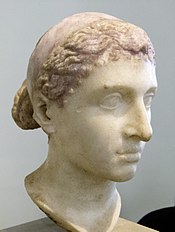 Cleopatra VII Philopator (in Greek, Κλεοπάτρα Φιλοπάτωρ; (Late 69 BC – August 12, 30 BC) was the last person to rule Egypt as an Egyptian pharaoh – after she died, Egypt became a Roman province. Cleopatra VII Philopator (in Greek, Κλεοπάτρα Φιλοπάτωρ; (Late 69 BC – August 12, 30 BC) was the last person to rule Egypt as an Egyptian pharaoh – after she died, Egypt became a Roman province.
She was a member of the Ptolemaic dynasty of Ancient Egypt, and therefore was a descendant of one of Alexander the Great’s generals who had seized control over Egypt after Alexander’s death. Most Ptolemeis spoke Greek and refused to learn Egyptian, which is the reason that Greek as well as Egyptian languages were used on official court documents like the Rosetta Stone. By contrast, Cleopatra learned Egyptian and represented herself as the reincarnation of an Egyptian Goddess.
Cleopatra originally ruled jointly with her father Ptolemy XII Auletes and later with her brothers, Ptolemy XIII and Ptolemy XIV, whom she married as per Egyptian custom, but eventually she became sole ruler. As pharaoh, she consummated a liaison with Gaius Julius Caesar that solidified her grip on the throne. She later elevated her son with Caesar, Caesarion, to co-ruler in name.
After Caesar’s assassination Mark Antony in opposition to Caesar’s legal heir, Gaius Iulius Caesar Octavianus (later known as Augustus). With Antony, she bore the twins Cleopatra Selene II and Alexander Helios, and another son, Ptolemy Philadelphus. Her unions with her brothers produced no children. After losing the Battle of Actium to Octavian’s forces, Antony committed suicide. Cleopatra followed suit, according to tradition killing herself by means of an asp bite on August 12, 30 BC. She was briefly outlived by Caesarion, who was declared pharaoh, but he was soon killed on Octavian’s orders. Egypt became the Roman province of Aegyptus.
Though Cleopatra bore the ancient Egyptian title of pharaoh, the Ptolemaic dynasty was Hellenistic, having been founded 300 years before by Ptolemy I Soter, a Macedonian Greek general of Alexander the Great. As such, Cleopatra’s language was the Greek spoken by the Hellenic aristocracy, though she was reputed to be the first ruler of the dynasty to learn Egyptian. She also adopted common Egyptian beliefs and deities. Her patron goddess was Isis, and thus, during her reign, it was believed that she was the re-incarnation and embodiment of the goddess of wisdom. Her death marked the end of the Ptolemaic Kingdom and Hellenistic period and the beginning of the Roman era in the eastern Mediterranean.
To this day, Cleopatra remains a popular figure in Western culture. Her legacy survives in numerous works of art and the many dramatizations of her story in literature and other media, including William Shakespeare’s tragedy Antony and Cleopatra, Jules Massenet’s opera Cléopâtre and the 1963 film Cleopatra. In most depictions, Cleopatra is put forward as a great beauty and her successive conquests of the world’s most powerful men are taken to be proof of her aesthetic and sexual appeal. In his Pensées, philosopher Blaise Pascal contends that Cleopatra’s classically beautiful profile changed world history: “Cleopatra’s nose, had it been shorter, the whole face of the world would have been changed.”
 Marcus Antonius, commonly known in English as Mark Antony (Latin: M·ANTONIVS·M·F·M·N)(January 14, 83 BC – August 1, 30 BC), was a Roman politician and general. As a military commander and administrator, he was an important supporter and loyal friend of his mother’s cousin Julius Caesar. After Caesar’s assassination, Antony formed an official political alliance with Octavian (the future Augustus) and Lepidus, known to historians today as the Second Triumvirate. Marcus Antonius, commonly known in English as Mark Antony (Latin: M·ANTONIVS·M·F·M·N)(January 14, 83 BC – August 1, 30 BC), was a Roman politician and general. As a military commander and administrator, he was an important supporter and loyal friend of his mother’s cousin Julius Caesar. After Caesar’s assassination, Antony formed an official political alliance with Octavian (the future Augustus) and Lepidus, known to historians today as the Second Triumvirate.
The triumvirate broke up in 33 BC. Disagreement between Octavian and Antony erupted into civil war, the Final War of the Roman Republic, in 31 BC. Antony was defeated by Octavian at the naval Battle of Actium, and in a brief land battle at Alexandria. He and his lover Cleopatra committed suicide shortly thereafter. His career and defeat are significant in Rome’s transformation from Republic to Empire.
In 54 BC, Antony became a staff officer in Caesar’s armies in Gaul and Germany. He again proved to be a competent military leader in the Gallic Wars. Antony and Caesar were the best of friends, as well as being fairly close relatives. Antony made himself ever available to assist Caesar in carrying out his military campaigns.
Raised by Caesar’s influence to the offices of quaestor, augur, and tribune of the plebeians (50 BC), he supported the cause of his patron with great energy. Caesar’s two proconsular commands, during a period of ten years, were expiring in 50 BC, and he wanted to return to Rome for the consular elections. But resistance from the conservative faction of the Roman Senate, led by Pompey, demanded that Caesar resign his proconsulship and the command of his armies before being allowed to seek re-election to the consulship.
This Caesar would not do, as such an act would at least temporarily render him a private citizen and thereby leave him open to prosecution for his acts while proconsul. It would also place him at the mercy of Pompey’s armies. To prevent this occurrence Caesar bribed the plebeian tribune Curio to use his veto to prevent a senatorial decree which would deprive Caesar of his armies and provincial command, and then made sure Antony was elected tribune for the next term of office.
Antony exercised his tribunician veto, with the aim of preventing a senatorial decree declaring martial law against the veto, and was violently expelled from the senate with another Caesar adherent, Cassius, who was also a tribune of the plebs. Caesar crossed the river Rubicon upon hearing of these affairs which began the Republican civil war. Antony left Rome and joined Caesar and his armies at Ariminium, where he was presented to Caesar’s soldiers still bloody and bruised as an example of the illegalities that his political opponents were perpetrating, and as a casus belli.
Tribunes of the Plebs were meant to be untouchable and their veto inalienable according to the Roman mos maiorum (although there was a grey line as to what extent this existed in the declaration of and during martial law). Antony commanded Italy whilst Caesar destroyed Pompey’s legions in Spain, and led the reinforcements to Greece, before commanding the right wing of Caesar’s armies at Pharsalus.
Administrator of Italy
When Caesar became dictator for a second time, Antony was made magister equitum, and in this capacity he remained in Italy as the peninsula’s administrator in 47 BC, while Caesar was fighting the last Pompeians, who had taken refuge in the province of Africa. But Antony’s skills as an administrator were a poor match for his generalship, and he seized the opportunity of indulging in the most extravagant excesses, depicted by Cicero in the Philippics. In 46 BC he seems to have taken offense because Caesar insisted on payment for the property of Pompey which Antony professedly had purchased, but had in fact simply appropriated.
Conflict soon arose, and, as on other occasions, Antony resorted to violence. Hundreds of citizens were killed and Rome itself descended into a state of anarchy. Caesar was most displeased with the whole affair and removed Antony from all political responsibilities. The two men did not see each other for two years. The estrangement was not of long continuance, with Antony meeting the dictator at Narbo (45 BC) and rejecting the suggestion of Trebonius that he should join in the conspiracy that was already afoot. Reconciliation arrived in 44 BC, when Antony was chosen as partner for Caesar’s fifth consulship.
Whatever conflicts existed between the two men, Antony remained faithful to Caesar but it is worth mentioning that according to Plutarch (paragraph 13) Trebonius, one of the conspirators, had ‘sounded him unobtrusively and cautiously…Antony had understood his drift…but had given him no encouragement: at the same time he had not reported the conversation to Caesar’. On February 15, 44 BC, during the Lupercalia festival, Antony publicly offered Caesar a diadem. This was an event fraught with meaning: a diadem was a symbol of a king, and in refusing it, Caesar demonstrated that he did not intend to assume the throne.
Casca, Marcus Junius Brutus and Cassius decided, in the night before the Assassination of Julius Caesar, that Mark Antony should stay alive. The following day, the Ides of March, he went down to warn the dictator but the Liberatores reached Caesar first and he was assassinated on March 15, 44 BC. In the turmoil that surrounded the event, Antony escaped Rome dressed as a slave; fearing that the dictator’s assassination would be the start of a bloodbath among his supporters. When this did not occur, he soon returned to Rome, discussing a truce with the assassins’ faction. For a while, Antony, as consul, seemed to pursue peace and an end to the political tension. Following a speech by Cicero in the Senate, an amnesty was agreed for the assassins.
Caesar’s assassination caused widespread discontent among the Roman middle and lower classes with whom Caesar was popular. The mob grew violent at Caesar’s funeral and attacked the homes of Brutus and Cassius. Antony, Octavian and Lepidus, capitalised on the mood of the plebians and incited them against the Optimates. Tension escalated and finally spiraled out of control resulting in the Liberators’ civil war
Antony and Cleopatra
Antony summoned Cleopatra to Tarsus in October 41 BC. There they formed an alliance and became lovers. Antony returned to Alexandria with her, where he spent the winter of 41 BC – 40 BC. In spring 40 BC he was forced to return to Rome following news of his wife Fulvia’s involvement in civil strife with Octavian on his behalf. Fulvia died while Antony was en route to Sicyon (where Fulvia was exiled). Antony made peace with Octavian in September 40 BC and married Octavian’s sister Octavia Minor.
The Parthian Empire had supported Brutus and Cassius in the civil war, sending forces which fought with them at Philippi; following Antony and Octavian’s victory, the Parthians invaded Roman territory, occupying Syria, advancing into Asia Minor and installing Antigonus as puppet king in Judaea to replace the pro-Roman Hyrcanus. Antony sent his general Ventidius to oppose this invasion. Ventidius won a series of victories against the Parthians, killing the crown prince Pacorus and expelling them from the former Roman territories which they had seized.
Antony now planned to retaliate by invading Parthia, and secured an agreement from Octavian to supply him with extra troops for his campaign. With this military purpose on his mind, Antony sailed to Greece with Octavia, where he behaved in a most extravagant manner, assuming the attributes of the Greek god Dionysus in 39 BC. But the rebellion in Sicily of Sextus Pompeius, the last of the Pompeians, kept the army promised to Antony in Italy. With his plans again disrupted, Antony and Octavian quarreled once more. This time with the help of Octavia, a new treaty was signed in Tarentum in 38 BC. The triumvirate was renewed for a period of another five years (ending in 33 BC) and Octavian promised again to send legions to the East.
But by now, Antony was skeptical of Octavian’s true support of his Parthian cause. Leaving Octavia pregnant with her second child Antonia in Rome, he sailed to Alexandria, where he expected funding from Cleopatra, the mother of his twins. The queen of Egypt lent him the money he needed for the army, and after capturing Jerusalem and surrounding areas in 37 BC, he installed Herod as puppet king of Judaea, replacing the Parthian appointee Antigonus.
Antony then invaded Parthian territory with an army of about 100,000 Roman and allied troops but the campaign proved a disaster. After defeats in battle, the desertion of his Armenian allies and his failure to capture Parthian strongholds convinced Antony to retreat, his army was further depleted by the hardships of its retreat through Armenia in the depths of winter, losing more than a quarter of its strength in the course of the campaign.
Meanwhile, in Rome, the triumvirate was no more. Octavian forced Lepidus to resign after the older triumvir attempted an ill-judged political move. Now in sole power, Octavian was occupied in wooing the traditional Republican aristocracy to his side. He married Livia and started to attack Antony in order to raise himself to power. He argued that Antony was a man of low morals to have left his faithful wife abandoned in Rome with the children to be with the promiscuous queen of Egypt. Antony was accused of everything, but most of all, of “going native”, an unforgivable crime to the proud Romans. Several times Antony was summoned to Rome, but remained in Alexandria with Cleopatra.
Again with Egyptian money, Antony invaded Armenia, this time successfully. In the return, a mock Roman Triumph was celebrated in the streets of Alexandria. The parade through the city was a pastiche of Rome’s most important military celebration. For the finale, the whole city was summoned to hear a very important political statement. Surrounded by Cleopatra and her children, Antony ended his alliance with Octavian.
He distributed kingdoms among his children: Alexander Helios was named king of Armenia, Media and Parthia (territories which were not for the most part under the control of Rome), his twin Selene got Cyrenaica and Libya, and the young Ptolemy Philadelphus was awarded Syria and Cilicia. As for Cleopatra, she was proclaimed Queen of Kings and Queen of Egypt, to rule with Caesarion (Ptolemy XV Caesar, son of Cleopatra by Julius Caesar), King of Kings and King of Egypt. Most important of all, Caesarion was declared legitimate son and heir of Caesar. These proclamations were known as the Donations of Alexandria and caused a fatal breach in Antony’s relations with Rome.
While the distribution of nations among Cleopatra’s children was hardly a conciliatory gesture, it did not pose an immediate threat to Octavian’s political position. Far more dangerous was the acknowledgment of Caesarion as legitimate and heir to Caesar’s name. Octavian’s base of power was his link with Caesar through adoption, which granted him much-needed popularity and loyalty of the legions. To see this convenient situation attacked by a child borne by the richest woman in the world was something Octavian could not accept. The triumvirate expired on the last day of 33 BC and was not renewed. Another civil war was beginning.
During 33 and 32 BC, a propaganda war was fought in the political arena of Rome, with accusations flying between sides. Antony (in Egypt) divorced Octavia and accused Octavian of being a social upstart, of usurping power, and of forging the adoption papers by Caesar. Octavian responded with treason charges: of illegally keeping provinces that should be given to other men by lots, as was Rome’s tradition, and of starting wars against foreign nations (Armenia and Parthia) without the consent of the Senate.
Antony was also held responsible for Sextus Pompeius’ execution with no trial. In 32 BC, the Senate deprived him of his powers and declared war against Cleopatra – not Antony, because Octavian had no wish to advertise his role in perpetuating Rome’s internecine bloodshed. Both consuls, Gnaeus Domitius Ahenobarbus and Gaius Sosius, and a third of the Senate abandoned Rome to meet Antony and Cleopatra in Greece.
In 31 BC, the war started. Octavian’s loyal and talented general Marcus Vipsanius Agrippa captured the Greek city and naval port of Methone, loyal to Antony. The enormous popularity of Octavian with the legions secured the defection of the provinces of Cyrenaica and Greece to his side. On September 2, the naval battle of Actium took place. Antony and Cleopatra’s navy was destroyed, and they were forced to escape to Egypt with 60 ships.
Octavian, now close to absolute power, did not intend to give them rest. In August 30 BC, assisted by Agrippa, he invaded Egypt. With no other refuge to escape to, Antony committed suicide by stabbing himself with his sword in the mistaken belief that Cleopatra had already done so. When he found out that Cleopatra was still alive, his friends brought him to Cleopatra’s monument in which she was hiding, and he died in her arms.
Cleopatra was allowed to conduct Antony’s burial rites after she had been captured by Octavian. Realising that she was destined for Octavian’s triumph in Rome, she made several attempts to take her life and was finally successful in mid-August. Octavian had Caesarion murdered, but he spared Antony’s children by Cleopatra, who were paraded through the streets of Rome. Antony’s daughters by Octavia were spared, as was his son, Iullus Antonius. But his elder son, Marcus Antonius Antyllus, was killed by Octavian’s men while pleading for his life in the Caesareum.
|








 The Battle of Actium was the decisive confrontation of the Final War of the Roman Republic. It was fought between the forces of Octavian and the combined forces of Mark Antony and Cleopatra. The battle took place on 2 September 31 BC, on the Ionian Sea near the Roman colony of Actium in Greece. Octavian’s fleet was commanded by Marcus Vipsanius Agrippa, while Antony’s fleet was supported by the ships of his beloved, Cleopatra VII, Queen of Ptolemaic Egypt.
The Battle of Actium was the decisive confrontation of the Final War of the Roman Republic. It was fought between the forces of Octavian and the combined forces of Mark Antony and Cleopatra. The battle took place on 2 September 31 BC, on the Ionian Sea near the Roman colony of Actium in Greece. Octavian’s fleet was commanded by Marcus Vipsanius Agrippa, while Antony’s fleet was supported by the ships of his beloved, Cleopatra VII, Queen of Ptolemaic Egypt. A galley is a type of ship propelled by rowers that originated in the eastern Mediterranean Sea and was used for warfare, trade and piracy from the first millennium BC. Galleys dominated naval warfare in the Mediterranean from the 8th century BC until development of advanced sailing warships in the 17th century. Galleys fought in the wars of Assyria, ancient Phoenicia, Greece, Carthage and Rome until the 4th century AD. After the fall of the Western Roman Empire galleys formed the mainstay of the Byzantine navy and other navies of successors of the Roman Empire, as well as new Muslim navies. Medieval Mediterranean states, notably the Italian maritime republics, including Venice, Pisa, Genoa and the Ottoman Empire relied on them as the primary warships of their fleets until the 17th century, when they were gradually replaced by sailing warships. Galleys continued to be applied in minor roles in the Mediterranean and the Baltic Sea even after the introduction of steam propelled ships in the early 19th century.
A galley is a type of ship propelled by rowers that originated in the eastern Mediterranean Sea and was used for warfare, trade and piracy from the first millennium BC. Galleys dominated naval warfare in the Mediterranean from the 8th century BC until development of advanced sailing warships in the 17th century. Galleys fought in the wars of Assyria, ancient Phoenicia, Greece, Carthage and Rome until the 4th century AD. After the fall of the Western Roman Empire galleys formed the mainstay of the Byzantine navy and other navies of successors of the Roman Empire, as well as new Muslim navies. Medieval Mediterranean states, notably the Italian maritime republics, including Venice, Pisa, Genoa and the Ottoman Empire relied on them as the primary warships of their fleets until the 17th century, when they were gradually replaced by sailing warships. Galleys continued to be applied in minor roles in the Mediterranean and the Baltic Sea even after the introduction of steam propelled ships in the early 19th century.
 common symbols of the Roman army (see Aquila). The two emblems were often combined to represent the god in the form of an eagle holding in its claws a thunderbolt, frequently seen on Greek and Roman coins. As the sky-god, he was a divine witness to oaths, the sacred trust on which justice and good government depend. Many of his functions were focused on the Capitoline (“Capitol Hill”), where the citadel was located. He was the chief deity of the early Capitoline Triad with Mars and Quirinus. In the later Capitoline Triad, he was the central guardian of the state with Juno and Minerva. His sacred tree was the oak. The Romans regarded Jupiter as the equivalent of the Greek Zeus, and in Latin literature and Roman art, the myths and iconography of Zeus are adapted under the name Iuppiter.
common symbols of the Roman army (see Aquila). The two emblems were often combined to represent the god in the form of an eagle holding in its claws a thunderbolt, frequently seen on Greek and Roman coins. As the sky-god, he was a divine witness to oaths, the sacred trust on which justice and good government depend. Many of his functions were focused on the Capitoline (“Capitol Hill”), where the citadel was located. He was the chief deity of the early Capitoline Triad with Mars and Quirinus. In the later Capitoline Triad, he was the central guardian of the state with Juno and Minerva. His sacred tree was the oak. The Romans regarded Jupiter as the equivalent of the Greek Zeus, and in Latin literature and Roman art, the myths and iconography of Zeus are adapted under the name Iuppiter. Cleopatra VII Philopator (in Greek, Κλεοπάτρα Φιλοπάτωρ; (Late 69 BC – August 12, 30 BC) was the last person to rule Egypt as an Egyptian pharaoh – after she died, Egypt became a Roman province.
Cleopatra VII Philopator (in Greek, Κλεοπάτρα Φιλοπάτωρ; (Late 69 BC – August 12, 30 BC) was the last person to rule Egypt as an Egyptian pharaoh – after she died, Egypt became a Roman province. Marcus Antonius, commonly known in English as Mark Antony (Latin: M·ANTONIVS·M·F·M·N)(January 14, 83 BC – August 1, 30 BC), was a Roman politician and general. As a military commander and administrator, he was an important supporter and loyal friend of his mother’s cousin Julius Caesar. After Caesar’s assassination, Antony formed an official political alliance with Octavian (the future Augustus) and Lepidus, known to historians today as the Second Triumvirate.
Marcus Antonius, commonly known in English as Mark Antony (Latin: M·ANTONIVS·M·F·M·N)(January 14, 83 BC – August 1, 30 BC), was a Roman politician and general. As a military commander and administrator, he was an important supporter and loyal friend of his mother’s cousin Julius Caesar. After Caesar’s assassination, Antony formed an official political alliance with Octavian (the future Augustus) and Lepidus, known to historians today as the Second Triumvirate.

